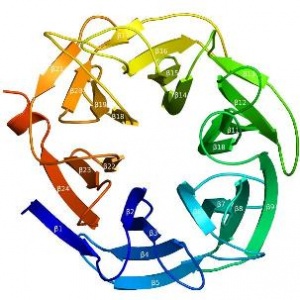CAZypedia celebrates the life of Senior Curator Emeritus Harry Gilbert, a true giant in the field, who passed away in September 2025.
CAZypedia needs your help!
We have many unassigned pages in need of Authors and Responsible Curators. See a page that's out-of-date and just needs a touch-up? - You are also welcome to become a CAZypedian. Here's how.
Scientists at all career stages, including students, are welcome to contribute.
Learn more about CAZypedia's misson here and in this article. Totally new to the CAZy classification? Read this first.
Difference between revisions of "Glycoside Hydrolase Family 93"
| Line 36: | Line 36: | ||
of sialidases of clan GHE. The catalytic machinery is however very different from that of sialidases. | of sialidases of clan GHE. The catalytic machinery is however very different from that of sialidases. | ||
| − | [[Image: | + | [[Image:Overalla4.jpg|thumb|widthpx| ]] |
== Family Firsts == | == Family Firsts == | ||
Revision as of 07:06, 28 July 2009
- Author: Annabelle Varrot
- Responsible Curator: Annabelle Varrot
| Glycoside Hydrolase Family GH93 | |
| Clan | GH-E |
| Mechanism | retaining |
| Active site residues | known |
| CAZy DB link | |
| http://www.cazy.org/fam/GH93.html | |
Substrate specificities
The characterized member of family 93 are known to hydrolyse α-1,5-L-arabinan. EC:3.2.1-
Kinetics and Mechanism
GH93 enzymes are exoenzymes which only release arabinobiose from the non-reducing end. Net retention of the configuration of the anomeric carbon is proposed from the products of the transglycosylation activity of the protein Abnx from Penicillium chrysogenum. It was recently supported in the crystal structure of the Arb93A enzyme from Fusarium graminearum in complex with arabinobiose.
Catalytic Residues
From the crystal structure of Arb93A, Glu170 and Glu242 are proposed to act as nucleophile and acid/base respectively. Mutagenesis experiment support their role in catalysis and they are strictly conserved between the family members.
Three-dimensional structures
The recent crystal structure of Arb93A reveals a six-bladed beta-propeller fold characteristic of sialidases of clan GHE. The catalytic machinery is however very different from that of sialidases.
